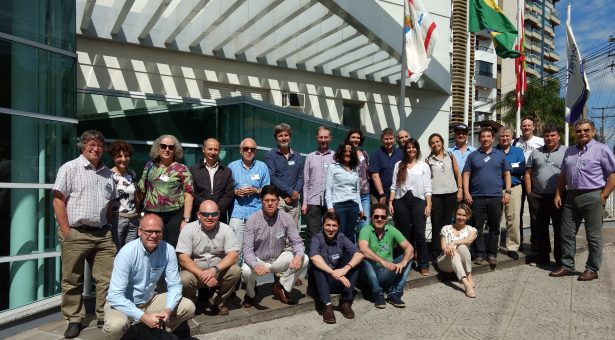Managing the microbes – the key to solving the global nitrogen crisis

Experts from the UK and Brazil have joined forces to address the challenges and opportunities for agricultural nitrogen science in Florianopolis, Brazil.
In the first meeting of its kind 24 leading experts from the UK and Brazil came together to find practical, low cost solutions that make more effective use of nitrogen (N) in agriculture, while attempting to decrease N pollution losses to the environment either to the atmosphere or through the soil.
The UK Brazil Nitrogen Fixation Centre (UBNFC) led by Ray Dixon, Professor of Molecular Microbiology at the John Innes Centre and NUCLEUS led by Sacha Mooney, Professor of Soil Physics in the School of Biosciences at the University of Nottingham focus on improving nitrogen use efficiency from both the agronomic and biological perspectives.
The workshop was funded by the Biotechnology and Biological Research Council (BBSRC) via the Newton Fund.
The meeting revealed the overlapping goals of the two research centres and identified several opportunities for collaboration that will develop the scientific and practical outcomes for the benefit of Brazilian and UK agriculture.
Professor Dixon said: “We are very grateful to the BBSRC for supporting this meeting to explore synergies between the two UK-Brazil virtual joint centres on agricultural nitrogen. The outcome of our discussions has uncovered exciting new opportunities to mitigate the impact of nitrogen fertilisers on the environment and increase agricultural productivity in Brazil through enhanced use of biological nitrogen fixation and improved agronomic practices.”
Professor Mooney said that while the two centres were following different approaches, there were clear synergies.
NUCLEUS has shown that combinations of natural soil amendments and leguminous trees planted between crops have the capacity to provide similar quantities of nitrogen to that from artificial fertilizers.
For important non-leguminous crops like maize and rice, UBNFC are isolating second generation bacterial inoculants that have great potential for supplying fixed N to plants when added to soil – although this is yet to be tested in the field.
“We have developed new plans to exchange ideas and scientists in the coming year to test this combination of approaches,” said Professor Mooney. “We are all really excited by the potential this offers.”
Explaining the problem of managing nitrogen in Brazil, Professor Ciro Rosolem from São Paulo State University and NUCLEUS lead in Brazil said: “Most tropical, weathered soils have low mineral N, and the introduction of legumes in crop rotation is one way to naturally increase soil N. However, heavy rainfall on fragile, tropical soils can lead to significant losses of N by leaching through the soil.”
NUCLEUS and UBNFC are funded by BBRSC in the UK and in Brazil via FAPESP (NUCLEUS) and CONFAP (Fundação Araucária – UBNFC; FAPEG and FAPEM – NUCLEUS).



